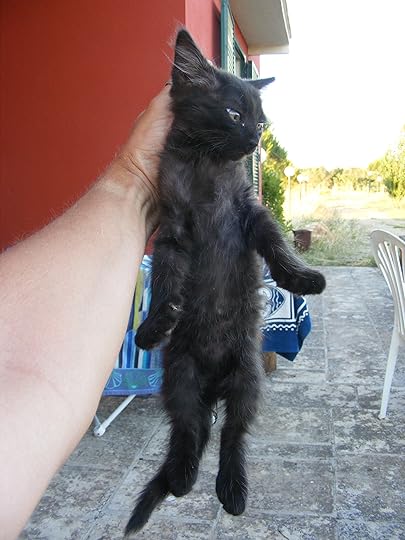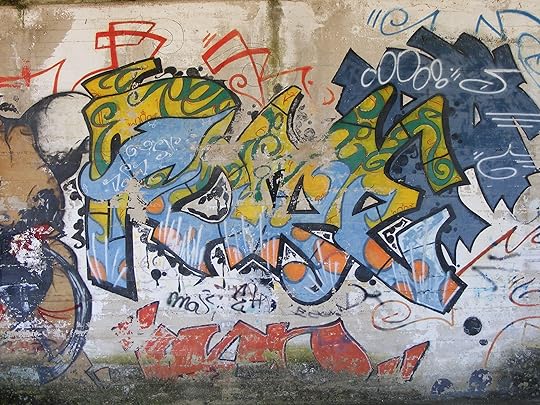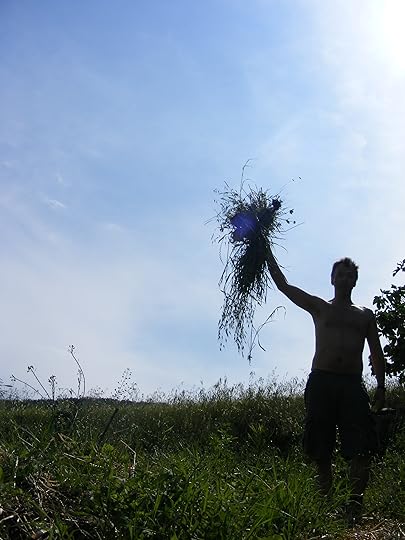K.P. Webster's Blog, page 23
June 25, 2013
A Very Italian Summer :: Regardless of Outcome
Tuesday 17th June
04:45 Silence alarm clock and open eyes.
04:55 Get out of bed and contemplate dressing.
05:05 Dress and go to the main house for breakfast.
05:20 Recommence digging the earth around the olive trees.
07:20 … No.
Already I realise that I can’t do this. It isn’t funny or true without the stuff I can’t write.
I first realised it on Friday night, which was the first time I became properly intoxicated in a way that, despite astonishing advances in science and technology and … well, in science and technology, is still considered by some – including most of the world’s law enforcement personnel – as a cause for some concern. So we won’t mention it. Suffice to say, it was under the purely positive influence of this beautiful, powerful, perception-enhancing herb that I realised I’m going to have to save most of the really juicy stuff that’s happening here for a novel.
Because all of the juicy stuff revolves around the people, and I can’t write what I want to, because it wouldn’t all be positive. Most of it would, but not all of it. And not only do I want to guard against personally upsetting anyone, or indeed incriminating anyone, I also don’t want to burn any bridges, sink any ships, blot any copy books, or shoot myself in the kazoo. Again.
So yeah, a novel. I already had a rough idea of two characters I would like to send on a WWOOFing trip around Italy. Now, as I’m experiencing the meat and bones of the plot firsthand – or at least the bones – I’m thinking of them, and how they might react to events as they unfold.
What a funny thing.
They’re called Rebecca and Hal, by the way. For the moment. Welcome them into your hearts. In less than four years’ time, you will see them portrayed by Carey Mulligan and Paddy Considine in the as-yet-untitled but almost certainly Oscar-winning film adaptation of the Booker Prize-winning novel. Or not. Who knows?
What a world, eh? What a world.
Ti bacio, ti abbraccio.
Here is a photograph…
June 23, 2013
Twelve Suppurating Scabs Do Not a Leper Make
Monday 17th June, 13:02
I haven’t quite figured out how, but I seem to have contracted leprosy. Consequently, I’m in quite a lot of pain. Mmmmm, pain.
We started digging around the olives today in heat that was anything between 80 and 150 degrees Celsius. I had to wear long trousers because in the past couple of days, as I say, my legs have come up like the acne-scarred face of a teenage leper.
There is a lady here who does reiki and massage and knows a thing or two about healing. Let’s call her Beryl. A nice Italian name. Beryl reckons I am allergic to something in the olive groves, and exposure to the sun has turned an ordinary allergic rash into a foul congregation of blisters. She gave me some aloe vera gel and I have promised to stay out of the sun for the rest of the day. I am very happy to stay out of the sun for the rest of the day, as I have some computer work to do, which I am about to start. The difficulty – although this, I hope, will be no reflection on the work – will be staying awake for the rest of the afternoon.
18:26
Oops.
I managed about three hours of work, and two of sleep. Or vice versa.
Now to return to my legs, which I fear I must. If you would like to see pictorial evidence of my wholly unexaggerated claims, you are in luck. For I have a camera. And I’m not afraid to use it. In fact, I took it out onto the olive groves on the first morning and do you know what I did? … I lost it.
An hour or two later … I found it. It was in the olive groves.
Then I lost my Opinel knife with the curved blade. Which – sadly – is still in the olive groves. That knife was essential for cutting away the old wool-ties. Fortunately, Cyrus gave me another knife for my birthday just before I came away. It isn’t curved like the one I lost, and it isn’t very sharp, or new, or particularly pretty. But it was a gift, goddammit, and gifts are, by their very nature, beautiful things.
Speaking of beautiful things, let us put off the inevitable no longer…

 It actually looks pretty tame, I know. I missed the worst of it I’m afraid. On the pus-side – I mean the plus-side, there are only seven or eight of these patches of intense irritation spread across both of my legs, and since I started wearing long pants in the fields, there is no evidence of new incidence.
It actually looks pretty tame, I know. I missed the worst of it I’m afraid. On the pus-side – I mean the plus-side, there are only seven or eight of these patches of intense irritation spread across both of my legs, and since I started wearing long pants in the fields, there is no evidence of new incidence.
Also, I just did a Google image search for leprosy. And now I am counting my blessings.
June 20, 2013
Zollino
Sunday or Monday, I don’t know … time is unravelling in the sun….
Someone asked me about accommodation. At this particular farm, which I am loath to name for reasons I shall describe elsewhere, I am accommodated in a concrete block. That doesn’t really do it justice, perhaps, but I’m not much good at physical description unless I really concentrate, and I’m a bit wasted at the moment and it’s late and I have to be up at the crack. I’ll get it sorted for the book, if there is one. In the meantime, here’s a picture…
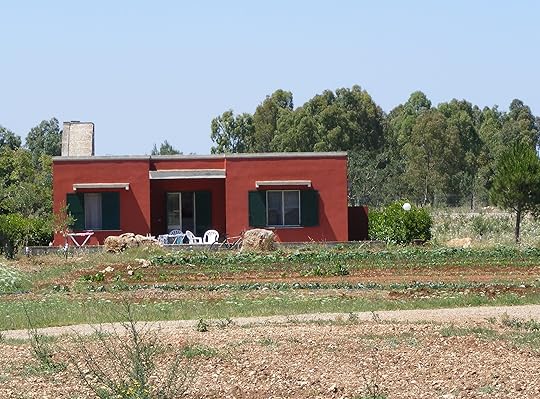 I have a room with three beds but as yet no one to share them with. There is a shared bathroom and a flat, sun-drenched roof which would be great for having sex on. (If I may speak frankly, which of course I may.)
I have a room with three beds but as yet no one to share them with. There is a shared bathroom and a flat, sun-drenched roof which would be great for having sex on. (If I may speak frankly, which of course I may.)
Riding back and forth between the concrete block and the restaurant and the olive tree fields and the tool bunker and big machine depository and the swimming pool and the main house and the office and the little town nearby for whatever and what-have-you, is absolutely magnificent. Over the gravel paths, along the edges of the fields, up and down the olive groves looking for a lost knife.
There are three of us sharing a bike. Early this afternoon I stole it and cycled into Zollino. Look – proof:
 Zollino is a tiny town with (or so I’ve heard) about 200 families. It’s not a poor town. You can see that much. I can’t imagine there’s a lot of crime or delinquency here. Unless you count graffiti. I don’t count graffiti as a crime, but you might.
Zollino is a tiny town with (or so I’ve heard) about 200 families. It’s not a poor town. You can see that much. I can’t imagine there’s a lot of crime or delinquency here. Unless you count graffiti. I don’t count graffiti as a crime, but you might.
There is an underpass which is used as a car park and graffiti workshop. I find it rather beautiful…
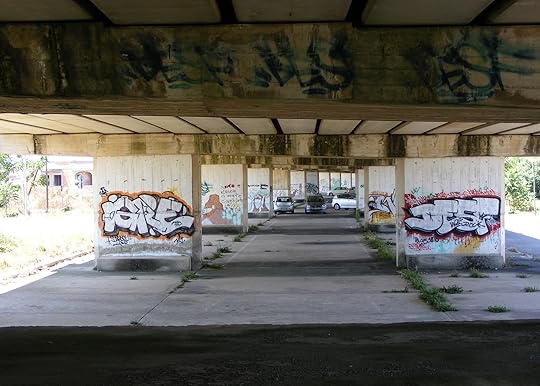 You can tell from the graffiti though, that there isn’t a great deal of disaffection here. This is about as subversive as it gets…
You can tell from the graffiti though, that there isn’t a great deal of disaffection here. This is about as subversive as it gets…
 I don’t count blasphemy as subversion, but you might.
I don’t count blasphemy as subversion, but you might.
The rest of the graffiti is rather playful in a rather childlike way…

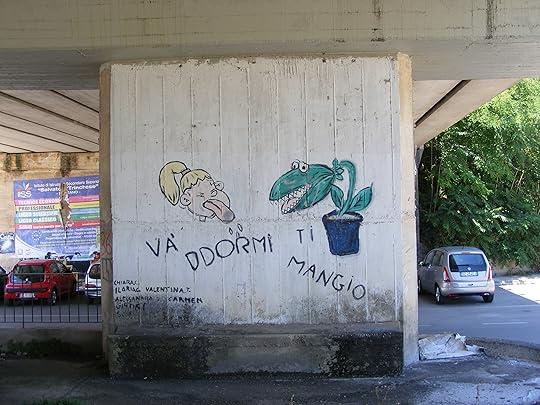 And occasionally quite beautiful…
And occasionally quite beautiful…
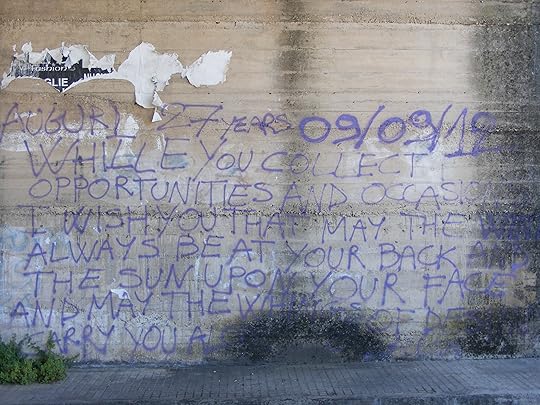 Now I must go lie in the sun. I’ve had a hard day.
Now I must go lie in the sun. I’ve had a hard day.
June 18, 2013
Into the Grove
Friday 14th June, 14:42
So far, here on the outskirts of Zollino, I have mainly been working in the olive groves, the work consisting mostly of replacing the glass wool on each olive tree. The glass wool is not toxic. I have quite a sensitive epidermis, but after three days, I have noticed no unpleasant side effects from handling the stuff for hours at a time. I would wear gloves, but each wrapping of wool must be tied to the tree with lengths of tie-able, pliable plastic, and for this task you need your fingers about you.
The trees were planted three years ago. They are an average of around 1.85 metres tall. There are 1,200 of them.
The wool is wrapped around the one-to-two-inch thick trunk of the olive tree. It is also wrapped around the sticks to which the trees are tied for support and guidance, and if necessary, if they are high enough, to the water feeders.
Each tree has a water feeder attached. The water feeder is made of black plastic hose, which snakes up each tree and ends in a kind of basketball hoop, which encircles the tree. The hoop has two opposing nozzles, out of which water sprays, once as the sun rises, and once as she readies herself for bed. And yes, the sun is a woman. And yes, she goes to bed.
Here are a thousand more words…
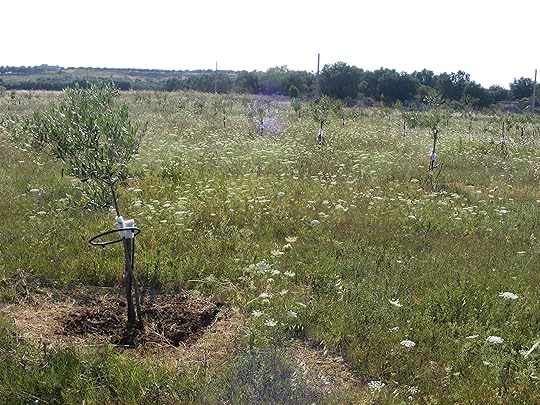 The glass wool is used (instead of chemical sprays) to prevent the march of the dreaded Olive Nut Snail, so-called because he goes nuts for olives. And because he’s a snail. And yes, the Olive Nut Snail is a man. And yes, he goes nuts for olives.
The glass wool is used (instead of chemical sprays) to prevent the march of the dreaded Olive Nut Snail, so-called because he goes nuts for olives. And because he’s a snail. And yes, the Olive Nut Snail is a man. And yes, he goes nuts for olives.
The Olive Nut Snail is good at clinging to stuff, so he can climb up sticks and trunks like Spiderman, but ask him to penetrate a couple of layers of well-secured glass wool and he invariably dies.
Here is a three-part pictorial illustration of the wool-replacement process, including scenes of mass snail graves, which some viewers may find upsetting…
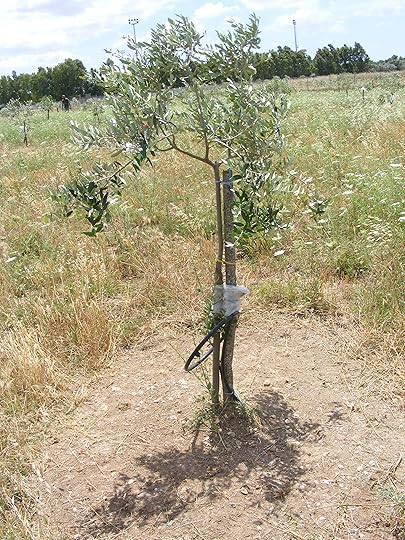
BEFORE: ugly old wool, sad-looking tree….
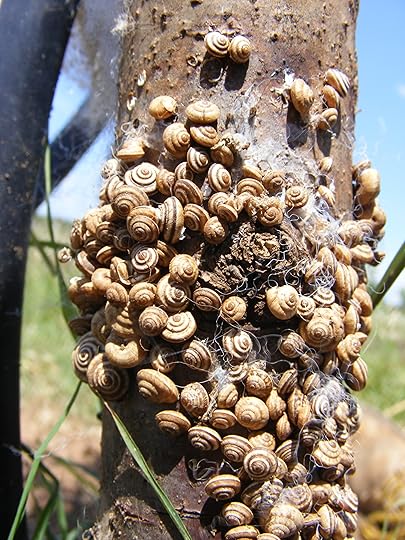
DURING: beneath the wool – a slow death-camp…

AFTER: pristine new wool, tree full of joy and free of snail.
Two or three hundred of the 1,200 trees had already been rewrapped before I arrived, so now it’s me and another two guys doing the rest. Let’s call them Ralph and Murray. Those are not their names though. They’re Tunisian. I don’t suppose there are many Tunisian Ralphs or Murrays. In fact, I’m willing to make a minuscule wager that there is not in fact a single one Tunisian Ralph. No bets on Tunisian Murray, however. I think with a different spelling, the odds on a Tunisian Murray are actually rather good. So I’m out.
And when we’ve finished rewrapping (hopefully tomorrow), we need to dig around each one, in order to aerate the soil and to remove the worst of the weeds. There are over a thousand trees. In actual fact, there are 1,200 trees. One thousand, two-hundred. Although 0.5 to 1.5 per cent of them are dead.
I’m scratching a lot, but having a very interesting time.
A very interesting time.
A presto.
June 14, 2013
Extraneous Moments :: France to Italy
Christ, I would kill for a bottle of moisturiser. In the meantime, here are some pictures. There will be a lot of these. I’m not sure extraneous is the right word, but you know what? i can’t bring myself to care too much. My mosquito bites have blistered in the sun and I’m itching like a syphilitic sore. Aaaaaah, Italy.
Anyway, this was a my last week in France and my first weekend here…
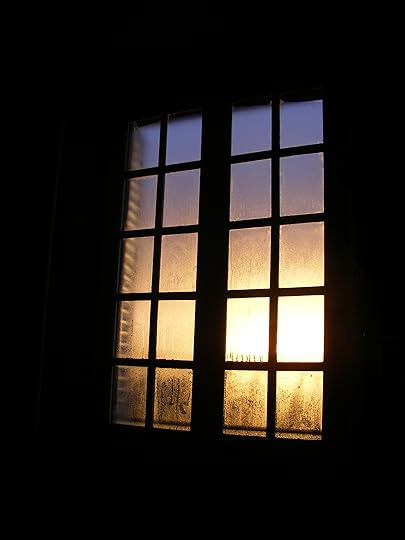
Dawn. La Courcelle. Awoken by baby. Inspired by light.
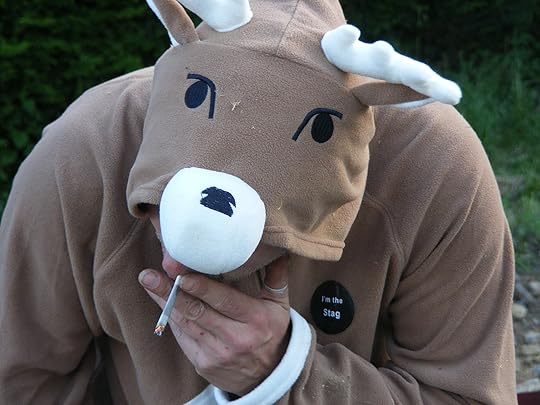
‘I’m the stag.’ A birthday gift from my sister. I’m 45 years old. And I’m the stag. I rock.
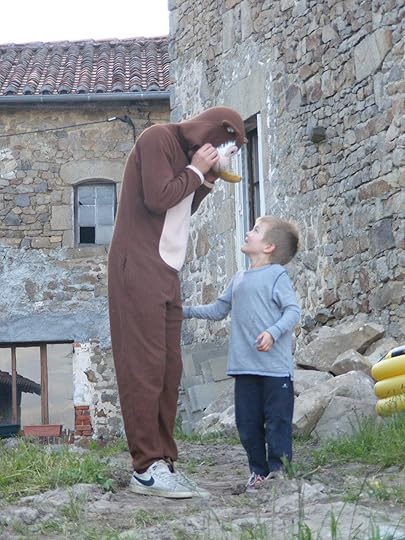
My nephew is the Monkey. You can tell because he’s holding a banana.
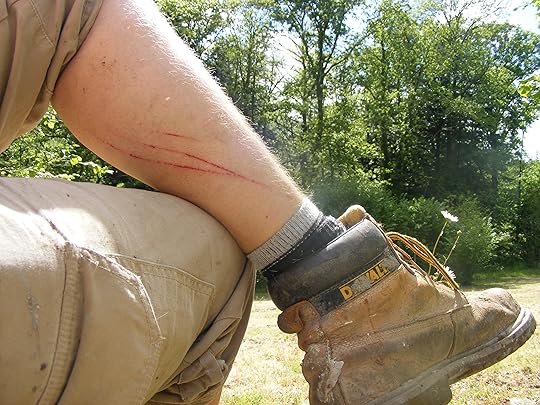
Hawthorn scratches. Since I decided that pain is merely pleasure wearing an ill-fitting hat, these things are to be embraced and celebrated. This may prove more difficult when the pain is more than a trifling sting, however. We shall see.

Shaun! On the way to a delightful day in wherever the hell we were. Stayed in a caravan. Had an awful lot of fun.
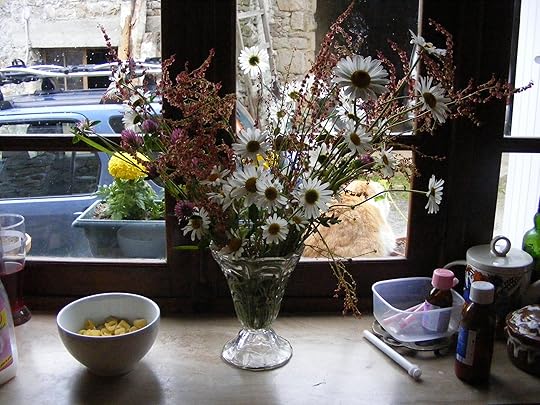
Wild flowers on the windowsill of my favourite kitchen.

I believe the children are our future. No, I really do. Especially children that look great with guitars.
Buon weekend.
x
June 13, 2013
These Boots Were Made For Working
Tuesday 11th June, 11:51
My boots were another birthday present from my sister, just before I moved to France two years ago last week. Here they are. Look at them…
 We’ve been through a lot together, my boots and I. We’ve seen things you people wouldn’t believe. We’ve rescued imperilled marsupials from scenes of woodland devastation. We’ve run panicking into the night with fire lapping at our soles. We’ve come unstuck in a sea of concrete. My boots have saved my toes innumerable times and I, in turn, have worked them into the ground and then bought them new laces. To keep them sweet.
We’ve been through a lot together, my boots and I. We’ve seen things you people wouldn’t believe. We’ve rescued imperilled marsupials from scenes of woodland devastation. We’ve run panicking into the night with fire lapping at our soles. We’ve come unstuck in a sea of concrete. My boots have saved my toes innumerable times and I, in turn, have worked them into the ground and then bought them new laces. To keep them sweet.
In the context of this WWOOFing lark, I see my boots as a kind of badge of honour. Every scratch, every stain, every hole in the leather is another sign of some effort I’ve made to improve something. My boots say a lot about my life over the past couple of years. They speak for me. In fact, just as someone at a Star Wars fan convention might let their full-body R2D2 tattoo speak for itself, so I see my boots tacitly declaring my fitness for farm work. I imagine my hosts taking one look at my boots and thinking to themselves, ‘Good God in heaven, here is a man who stood up against the brambles, the bedrock, the raised beds, the rogue axe-swing. Here is a man who stood up.’
In short, I love my boots. And I’d be lost without them.
That’s why it was extremely stupid of me to leave them outside my friends’ house last night when I went to get the train to Lecce.
Extremely stupid.
Jaw-droppingly stupid.
Sometimes it baffles me how I can manage to be such an airhead and yet still manage to bimble about for the most part getting stuff done. But other times it makes perfect sense.
As it happens, the overnight train I wished to travel on was already fully booked. I was peeved at the time at my own foolishness for not booking a seat earlier. So I booked one there and then for today – the train I’m on right at this moment – and spent another night in Mezzo di Lavino, just outside of Bologna.
It wasn’t until this morning right at the last minute, seconds before hoisting my rucksack onto my back and leaving for the second time, that I realised my boots were not where they should be.
I was very relieved.
It amuses me to think that if I’d got my shit together and booked a seat on the overnight train, I would have arrived in Lecce this morning with just my swan-skin trainers, looking for all the world like some ageing gap-year greenhorn with pampered hands and metrosexual tendencies. Instead, my two acts of cerebral negligence cancelled one another out and now, although I’m half a day later than anticipated, I’m saving money on a train, my boots are with me and everything is going to be alright.
June 10, 2013
Perfect Longing
‘Being is other people.’
Aristotle Brownsmock, Epigrams for the Journey
Farm #1 :: North-west Italy :: nearest city – Fidenza
My introduction to the wonderful world of WWOOFing lacked only one thing: WWOOFing. I knew before I arrived, however, that there wouldn’t be much to do. It was really much more of a social call. A kind of welcome to Italy.
I sent out my first contact emails on Saturday 13th April. Maia responded within an hour or two. ‘What a colourful life you have,’ she said, and I remembered again that I did, and that I do, and that I’m extremely fortunate. She told me I was most welcome to come visit but I should know that she was planning to move to India very soon so it could only be a brief stay.
I knew from Maia’s WWOOF listing that she was a Steiner teacher (which interested me immediately), that she kept a synergistic and biodynamic vegetable garden, fruit trees and some bees. I knew she was vegetarian and keen to share ‘yoga, music, nature, art and spiritual activities’. And I know now that on reading those words, there will be those amongst you who will baulk and cringe and roll your eyes. And that’s too bad. Luckily for me, Maia sounded like exactly the kind of person I wanted to meet.
This is where she lives…
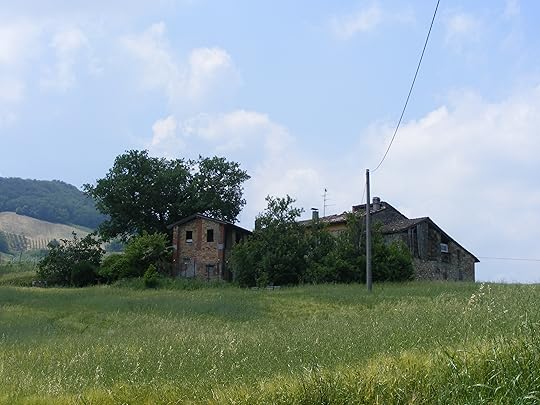 Maia met me outside of Fidenza station. We spotted one another and waved. She was warm and pretty and smiling and talky and we hit it off immediately. She was also slightly preoccupied about all of the things that still had to be sorted before she went to India – if she went to India. At the time she wasn’t sure. Things weren’t happening fast enough. Her contacts in India, at the school she was hoping to work in, at the Ministry of Foreign Trade and What-Have-You, at the Immigration Offices and Pet Control Centre were each telling her different things, mostly regarding the repatriation of her nervous little dog, Suhi. She was also feeling guilty, she said, because there wasn’t much for me to do and she’d be out a lot, working and trying to organise things. I explained that the experience of just meeting her and staying at her place for a few days was enough for me, and I wasn’t short of things to do. I foresaw a few lazy days, writing and reading, sunning myself like a lizard. I would also proofread a novel – this is a real job I have to do, for real money. I foresaw all these things. But in the end it wasn’t to be.
Maia met me outside of Fidenza station. We spotted one another and waved. She was warm and pretty and smiling and talky and we hit it off immediately. She was also slightly preoccupied about all of the things that still had to be sorted before she went to India – if she went to India. At the time she wasn’t sure. Things weren’t happening fast enough. Her contacts in India, at the school she was hoping to work in, at the Ministry of Foreign Trade and What-Have-You, at the Immigration Offices and Pet Control Centre were each telling her different things, mostly regarding the repatriation of her nervous little dog, Suhi. She was also feeling guilty, she said, because there wasn’t much for me to do and she’d be out a lot, working and trying to organise things. I explained that the experience of just meeting her and staying at her place for a few days was enough for me, and I wasn’t short of things to do. I foresaw a few lazy days, writing and reading, sunning myself like a lizard. I would also proofread a novel – this is a real job I have to do, for real money. I foresaw all these things. But in the end it wasn’t to be.
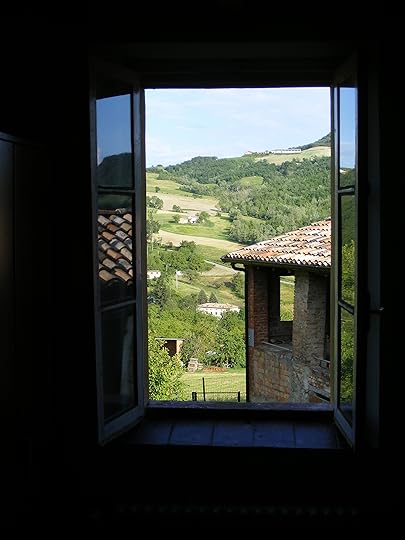 ‘I also have something to ask you,’ said Maia in the car on the way back to her farm. She explained that another WWOOFer had been in touch and wanted to come and stay for a few days, and would I mind. I thought it was funny that she was asking me such a question. She was so considerate. ‘Well, to be honest, I’d rather be by myself while I’m here.’ I didn’t say that. Who would say that? Would anyone say that? I didn’t say that. I said of course I didn’t mind. I said, ‘The more, the merrier.’
‘I also have something to ask you,’ said Maia in the car on the way back to her farm. She explained that another WWOOFer had been in touch and wanted to come and stay for a few days, and would I mind. I thought it was funny that she was asking me such a question. She was so considerate. ‘Well, to be honest, I’d rather be by myself while I’m here.’ I didn’t say that. Who would say that? Would anyone say that? I didn’t say that. I said of course I didn’t mind. I said, ‘The more, the merrier.’
Phoebe was 24 years old, and German. That was all the information I had and more than enough for my brain to throw up a pile of lazy stereotypes. I imagined a buxom girl with a ruddy complexion, combat shorts and long blonde hair bouncing round her shoulders in sturdy plaits. Her cheeks would glow red when she laughed and her laugh would be punctuated with sharp hiccupping sounds as she harvested enough air to continue laughing.
‘I don’t normally accept people so young,’ said Maia, who was seven or eight years younger than me, ‘but she sounded really nice, so I thought I’d ask you what you thought before I said yes. She could be company for you when I’m not here.’
Phoebe was nothing like the one-dimensional bierkeller-girl in my head. Thankfully. Phoebe was tall and thin and dark and pale with black crash helmet hair that she cut herself and a laugh that ranged from quiet dance to landmine, taking in everything from mildly to wildly erotic along the way. After our first walk into the hills together, I found myself really wishing that Phoebe was at least 30 years old, then I wouldn’t feel like such a lazy stereotype myself.
But then she had to be exactly who she was and what she was – and nothing else – for things to be just as they were.
So there we were, together in the Italian hills for three-and-a-half days. It was idyllic…
 I found a little strimming to do on the first day, and a little permaculture spiral maintenance on the second, but for most of the time we sat around together playing with my guitar – which is actually Cyrus and Ruby’s guitar, a €40-half-size from Lidl – and talking about things. I like talking about things a lot. In fact, talking about things is one of my all-time favourite pastimes.
I found a little strimming to do on the first day, and a little permaculture spiral maintenance on the second, but for most of the time we sat around together playing with my guitar – which is actually Cyrus and Ruby’s guitar, a €40-half-size from Lidl – and talking about things. I like talking about things a lot. In fact, talking about things is one of my all-time favourite pastimes.
In the evenings we saw Maia, and ate with her and met some of her friends and made fire, then when Maia went to bed, we stayed up playing games and guitar in the dark, and talking about more things – there was never any shortage of things to talk about. It was incredibly pleasant. We got along very well.
On the second afternoon, lying on our backs in the short grass at the edge of a giant wheat field, eyes closed to the sun which had finally arrived with some kind of conviction, I asked her if it would make her feel terribly uncomfortable if I told her that I found her terrifically attractive.
I had to. You have to. One has to.
She laughed. Like a firework. ‘What is “uncomfortable”?’ she asked. Her English was easily good enough to know but I guess she wanted to be sure.
‘You know, awkward, not feeling at ease, not wanting to be around me anymore, wanting to be sick on your own shoes.’
She decided that such a revelation would not make her feel comfortable but informed me that she didn’t feel the same. I pointed out that I hadn’t actually said that I did find her terrifically attractive and she replied – as cool as a whole cruise ship full of cucumbers – ‘I know.’
‘But I do,’ I confessed, smiling, farmer’s crow’s-feet burning into my funny old face.
And then we went back to how we were before, as if nothing had been said, and it was good. There were moments over the next day and a half when my self-destructive side would hiss at me, informing me that I was a wretched, middle-aged lech, ridiculous and pathetic, destined to stagger from one rejection to the next until the day I finally drift from total desolation to lingering death, in rags and emotional agony, stinking of cliché. But he never got that far before he was silenced and skulked off, with my laughter in his ears and my piss all over his back.
There’s a line from a film I can remember nothing else about apart from the title. It’s this: ‘It’s good to want things.’ And it is good to want things. And it’s good to not be able to have the things that you want. It’s actually good. It’s enjoyable.
And I did enjoy meeting Phoebe very much. I enjoyed her bare feet and fascination and her phantoms and her relentlessly playful imagination; I enjoyed her searching for sense and messing about in the future and climbing the sides of houses and wanting to be good at important things, and never flinching. And I enjoyed her courage and her modesty and her singing voice, which was sharp and soft and penetrating, like blood.
We wrote a song for Maia, Phoebe and I. It was so incredibly sweet that if certain amongst you had been there, cynical old anuses that you are, you’d have thrown up so hard you would have choked on your own pelvises. But it was also very beautiful, and we meant it, and Maia was very touched, even though I fucked up my part like a lemon.
On the third afternoon we blagged a lift into town at the local bar and sat in the sun drinking and talking, then we got lost and blagged another lift to an Indian takeaway. That night we saw peacocks, and stayed up late burning things.
On my last afternoon, Phoebe and I were back at the wheat’s end, smoking cigarettes in the sun, when Phoebe said she was glad that I was leaving in a couple of hours. When I asked why, she told me that it was good that our story ended here. She said she could feel herself growing closer. She said she’d thought about kissing me, but she could see that it would end badly. So she was glad we would stop when we did.
I think the old me would have taken this as an opportunity to become more insistent, sensing a spark of opportunity. But the old me was a bit of a dick. I thanked Phoebe for telling me, and then we talked about it for a little while longer, and then we moved on.
Before I left, Maia gave us both gifts that she had made for us. Phoebe’s was a female figure made from wire, long-limbed and graceful, dancing. Mine was a lucky woollen rabbit.
 Early on Friday evening on the train back to Bologna for a couple of days, I felt so overpowered by happiness and excitement for the future that I spontaneously combusted.
Early on Friday evening on the train back to Bologna for a couple of days, I felt so overpowered by happiness and excitement for the future that I spontaneously combusted.
I didn’t really spontaneously combust. Sorry. But I was pretty damn happy. I still am.
My five days near Fidenza proved the best possible start to this adventure. Better than if I’d persuaded Phoebe that kissing me was actually a great idea, and then we’d kissed and clenched fingers and made love in a clearing in the wheat.
I actually mean it.
Better than that.
Tonight I take the overnight train to Lecce.
Now I’m going to try and buy a SIM card.
Good luck, Maia. Good luck, Phoebe. Good luck, Suhi.
It was immense.
x
June 4, 2013
Self-Publishing Masterclass :: Smashwords :: Mark Coker
The rise and rise of a successful publishing business built on fun, problem-solving and putting people first…
 A few weeks ago I came across a blog post by the founder of Smashwords, Mark Coker, entitled ‘How to Bring a Book Back from the Doldrums‘. Aside from helpful and unflinching advice from someone who knows the self-publishing business inside out, the piece also featured the transcript of a conversation Coker had had on Facebook with a disgruntled self-published author. Despite the fact that the author comes across as desperate, paranoid and petulant, Coker himself is patient, reasonable and never less than compassionate, in a way that it’s hard to imagine many CEOs of Forbes’ Top 100 American Most Promising Companies being.
A few weeks ago I came across a blog post by the founder of Smashwords, Mark Coker, entitled ‘How to Bring a Book Back from the Doldrums‘. Aside from helpful and unflinching advice from someone who knows the self-publishing business inside out, the piece also featured the transcript of a conversation Coker had had on Facebook with a disgruntled self-published author. Despite the fact that the author comes across as desperate, paranoid and petulant, Coker himself is patient, reasonable and never less than compassionate, in a way that it’s hard to imagine many CEOs of Forbes’ Top 100 American Most Promising Companies being.
“Where other people see intractable problems, I see opportunities”
Smashwords, for those who don’t know, is the world’s largest distributor of independent books. It’s a self-publishing platform and ebook distributor, much like Amazon’s Kindle Direct Publishing, but a kind of grassroots version – Kindle with a soul, you might say. Indeed, in these dark days of gangster bankers and morally bankrupt CEOs, Smashwords is the kind of burgeoning business that gives you hope that capitalism doesn’t necessarily need to be burned to the ground if humanity is to prosper. And it’s Coker’s belief that ‘people always come first’ that makes it so. Therefore, it should really come as no surprise (although frankly it still does) that when I asked him if he’d answer a few questions for this blog, he said he’d be happy to. Here’s what we talked about…
Early love of business. From eggs to email…
‘Ever since I can remember,’ says Coker, ‘I’ve enjoyed business. When I was six or seven, I would sell my pet chickens’ eggs door to door in my neighbourhood.’ Then when he was at high school, he began investing in the stock market, and even though he was pretty useless at it, he immersed himself in it, reading The Wall Street Journal, Forbes and Fortune in his spare time. ‘It was fun for me then – as it is now – to study what made companies successful, and what made them fail.’
Coker’s dad too was a businessman – an inventor and habitual problem-solver who quit a good job at IBM to start his own company. Irritated by the fact that his kids didn’t seem capable of turning off a light before leaving a room, Coker Senior invented a timer that could switch off a light after a set period of time. ‘Problem solved,’ says Coker. Then his dad started selling and distributing them through local hardware stores. ‘We manufactured them at home. I remember how we’d clear the table after dinner, and the family would sit around the kitchen table with soldering irons in hand, soldering wires to printed circuit boards and assembling the timers.’ This was Coker’s first experience of a production line, and like most of his consequent business experiences, he found it a source of great fun.
“Our challenge is to provide the greatest possible value to the greatest number of authors while still earning enough to keep the lights on”
After school he had his heart set on UC Berkeley, so much so that he didn’t bother applying anywhere else. ‘I heard they had a good economics program, and I felt an affinity to the school.’ That affinity was due in no small part to the fact that his parents had been students there in the ’60s – ‘I don’t remember it, but my mom tells me she brought me to the free speech demonstrations in my stroller’ – and that Coker himself was born there. Berkeley was in his blood.
Whilst there, Coker founded a publication called The Ridge Roach out of his student-run dorm. (The ‘Ridge’ part came from the dorm’s name, The Ridge Project. The ‘Roach’ part quite possibly having something to do with the thickness of the paper it was printed on.) The monthly newsletter featured poetry, illustrations, articles and stories all sourced from members of Coker’s dorm. ‘I got local businesses to advertise in it, and it actually turned a profit for the house.’ Coker was also responsible for a slightly scurrilous gossip column, which was loved and loathed in equal measure by fellow students. More importantly, he says, ‘The Ridge Roach gave me a great appreciation for the amazing talent locked in the minds and fingertips of ordinary people.’
What five years of university also gave Coker was a more well-defined interest in business, leadership and the media. Meanwhile, the Berkeley anti-Apartheid demonstrations gave him his first taste of how individual business decisions could have a positive impact on the world at large. ‘At first,’ he remembers, ‘I thought it was stupid that the students were holding rallies to demand that the Regents [the governing body of the University of California] divest their portfolios of any companies doing business in South Africa. But then as the movement spread, and companies supporting the Apartheid government started making concessions, it all made sense to me. A company lives and dies by its stock price, so if large pension funds start selling the stock, the stock goes down, the executives earn less money, and suddenly their pants are on fire. Hit them where it hurts.’

Anti-Apartheid rally at UC Berkeley
Meanwhile, it was in the mid-80s that the tech economy was beginning to emerge and although Coker felt no natural affinity with technology, his father had sold his switch-timer business and set up a one-man startup specialising in email software. It was, Coker recalls, for ‘a lark’ that his dad printed up business cards for him, conferring upon him the title VP of Marketing and Sales. But Coker took it seriously. ‘I started working for him out of my dorm room at Berkeley, for no pay. He didn’t give me a marketing budget either, so I had to figure out a way to make the phone ring without spending money. That’s how I fell into PR.’
“We try to learn from our mistakes. All we can do is try our best, stay honest and aim high”
In search of press coverage for his dad’s product, Coker started calling up reporters and asking for reviews. ‘I had absolutely no clue what I was doing, but that was part of the fun. As long as you know what problem you want to solve, and you know how to ask questions, you can work your way toward the solution… One reporter asked me to send him a press kit. “What’s a press kit?” I asked.’ The reporter was kind enough to tell him, explaining that it should include a press release. ‘What’s a press release?’ he asked.
Coker had so much fun doing PR for his dad’s company that he almost dropped out of school to pursue it full-time. Luckily, he says, ‘better sense prevailed’ and he managed to graduate with a marketing degree while working all the while for his dad on the side. ‘Then I moved home and worked out of the garage with him for another three years.’
After which, while waiting to hear from a bunch of MBA programmes to which he’d applied, Coker found himself a blue collar job building mainframe hard disk drives on the IBM assembly line. Here Coker’s childlike fascination with how things work garnered him a reputation as someone who asked too many questions, and his love of problem-solving earned him a couple of IBM’s cash incentive awards when he fixed a dodgy conveyor belt and a poor product-pallet interface. ‘Where other people see intractable problems,’ he says, ‘I see opportunities.’
“It’s important our authors know we’re profitable because it means we’ll be around tomorrow to serve them, and to pay them “
While at IBM, he was accepted on Carnegie Mellon University’s MBA program, specialising in Entrepreneurship. However, since he was ‘having so much fun working the assembly line’, he deferred. Then, during the recession of 1991, he was laid off and suddenly found himself out of work and with no formal business experience outside of doing his dad’s PR. So he scouted around and soon found himself work at a large Silicon Valley PR agency.
‘That was a fun job,’ he says. His clients were the CEOs of new startups and large publicly traded companies. ‘I was always blown away that these super-successful CEOs were turning to me for counsel on PR. They thought we were magicians because the press coverage we got helped make them, their products and their companies more successful.’
Coker stayed there for two years, first of all specialising in disk storage clients, because of his IBM experience, then diversifying. Another early client was a then unknown anti-virus software startup called McAfee Associates. Coker was McAfee’s first external PR guy and his affiliation with the company would prove to be hugely significant…
Setting up on his own. From PR to publishing…
After just under two years, Coker began to get itchy feet. Although it had always been his dream to start his own business, he had assumed that, like his father before him, it would involve manufacturing a product he’d invented. But it wasn’t. It was a PR company called Dovetail.
‘Although I knew how to get great PR coverage for my clients,’ he says, ‘I had no clue what was involved in running a PR agency.’ Of course this is what made the whole venture a challenge, and therefore fun. ‘You learn by doing,’ he adds.
The PR agency job allowed him to work directly with more CEOs of tech companies, large and small. ‘I was a sponge,’ he says. ‘I learned so much from them, while at the time applying my problem-solving skills to the practice of PR. This is also when I honed my writing skills, and my thinking about strategic communications strategy. PR is grounded in good writing and smart thinking. Your job is to create awareness and perceptions that help you achieve a business objective. The best, most powerful PR is always grounded in the truth, and this was a philosophy I always practised with my clients.’
 A few years’ later, Coker would write a book about PR, passing on his passion for what he saw as an ‘amazingly powerful, magical tool. I used my skills to help my clients become very successful at opening new markets and creating leadership positions. I helped create a lot of wealth for my clients.’
A few years’ later, Coker would write a book about PR, passing on his passion for what he saw as an ‘amazingly powerful, magical tool. I used my skills to help my clients become very successful at opening new markets and creating leadership positions. I helped create a lot of wealth for my clients.’
Things changed again when Coker was invited by the new CEO of McAfee to listen in on his first quarterly conference call with Wall Street analysts. ‘This is something all publicly traded companies do. Each quarter, minutes after announcing their quarterly earnings, they hold a conference call with Wall Street analysts and large investors to talk about the quarter… Listening to the call, I was blown away by the great information I learned. That gave me the idea to start attending the conference calls of some of the companies I’d invested in.’
One of the companies he’d invested in, however – Legato Systems = refused to let him in on their call. They said the call was only open to large investors and analysts. ‘I responded that I was an investor,’ says Coker, ‘and it shouldn’t matter if I owned one share or one million. I felt I had a right to attend the call.’ It felt to Coker like selective disclosure, which held up a middle finger to the little man and ‘allowed the Wall Street bigwigs to trade on the information before it became known to the smaller individual investors such as myself.’
“Our little startup helped change the way Wall Street communicates with investors”
Legato ignored his arguments, however, and shut him out. So Coker did a little research and discovered that over 90% of publicly traded companies had a similar policy of excluding small investors. Dismayed, he decided to do something about it and set about creating BestCalls.com.
In order to do this, he sold the stock of his PR company and plough his $120,000 profit into the creation of this new company, which was a publicly accessible directory of conference calls that were open to small investors. ‘We would publish the schedules and access information for the few companies who did allow small investors. My goal was to celebrate the companies who allowed small investors to attend, and shame the companies who didn’t. I figured the progressive companies would earn more investor trust, earn more investors, and as a result get higher stock prices.’
Using his magical PR skills, he placed stories about BestCalls in the Wall Street Journal, the San Francisco Chronicle, Forbes, Fortune, Wired and Time Magazine. He also lobbied the Securities and Exchange Commission and eventually helped spark a public uproar that led the SEC to introduce new regulation on fair disclosure. ‘Regulation FD prohibited selective disclosure on conference calls. That blew the doors wide open and today all companies allow small investors to listen in.
‘My BestCalls experience taught me how to use a startup to rally the little guys together to achieve a higher social purpose. Our little startup helped change the way Wall Street communicates with investors.’
In many ways, Coker is like the Harry Tuttle of the business world. Tuttle was the renegade plumber in Terry Gilliam’s darkling dystopia, Brazil. Played by Robert de Niro, he was the guy who abseiled into the thwarted lives of the little man and sorted out their tubes when the government didn’t give a damn. He was the one for whom the state slogan, ‘We’re all in it together’, was more than just an empty soundbite.

Harry Tuttle: the Mark Coker of underground plumbing.
Soon after the Fair Disclosure regulation was passed, in the first years of the new millennium, the dot come bubble had burst and Coker found that the fun was beginning to leak out of the PR business. He was becoming interested in different things. So he sold BestCalls.com, and he got married. Coker’s wife, Lesleyann, was a former reporter for Soap Opera Weekly, and consequently a mine of stories of soap star ego and petty excess. Coker suggested she write a book about it. Lesleyann suggested they do it together and, being more than ready for something new, her husband agreed.
So they dropped everything, moved to Burbank for two months and took advice on how to become investigative journalists from a reporter friend of Coker’s who’d covered the Monica Lewinsky scandal. ‘We asked questions, developed sources, and collected a lot of dirt,’ he says. ‘Then we moved to Vermont for four months, holed ourselves up in a cabin in the woods and wrote the book.’
For the next couple of years, they hired professional editors, did dozens of rewrites and eventually found a top New York agent who – over a period of two whole years – completely failed to find a publisher. Soap opera novels hadn’t sold well in the past so they were not considered commercially viable. No one would touch it.
‘Our inability to find a publisher is how I stumbled into the problem with traditional publishing. I imagined millions of other writers like us who’d never be able to reach readers with their books simply because a publisher didn’t think they could sell it.’ This, he decided, was a big problem. ‘It was a social injustice to writers and readers alike. Books are more valuable to humankind than commercial merit.’ As he told Forbes magazine in June last year, ‘Commercial merit is a dangerous way to judge a book. It means you get more stuff by Kim Kardashian than by undiscovered authors potentially writing future classics.’

The Kardashians, killers of klassics.
Once he felt the problem in his gut, he began to think about a solution. ‘The problem was that big publishers were unable to take a risk on every author. In fact, they had no interest in taking a risk on every author. The solution I came up with was Smashwords. My idea was simple, and started with a question: “What if I could create a web site that would allow any writer, anywhere in the world, to publish an ebook for free?” One thing that attracted me to the challenge was that it was a totally crazy idea. It went against the grain of conventional thinking.’
 The birth of Smashwords. From struggling startup to profitable publisher…
The birth of Smashwords. From struggling startup to profitable publisher…
In 2005, when Coker first began work on Smashwords, there was still a huge negative stigma associated with self-publishing. ‘Self-published authors,’ Coker points out, ‘were viewed as failures according to conventional wisdom. I thought conventional wisdom was wrong. I felt the world needed something like this some day, because you can’t deny writers the ability to publish. Such a platform, I imagined, could unlock and unleash the true potential of writers. If we let readers decide which books were really worth reading, the cream would rise to the top. I felt every writer deserved the right to be published as a matter of free speech.’
The business model for Smashwords remains unconventional, mostly because it has the word ‘free’ at the heart of it. It’s one of the things that’s most refreshing about Coker’s business ethos, that he seems to put people before profit.
‘People – whether they be our authors, partners or employees – always come first, but profit is the fuel that allows you to continue serving your people. This is one of the lessons I learned with BestCalls. When I started BestCalls, it was a cause wrapped in a web site’s clothing. I didn’t think about the business model prior to launch because the cause overpowered everything. I had to figure out the business model afterward, and that limited our ability to generate income and hire personnel.
‘Although BestCalls was a tremendous success from the perspective of changing the world for the better, it took us a while to get the business model to even meagre profitability.
“Most writers don’t have a lot of money, and even if they did, I don’t want it”
‘With Smashwords, the cause was always central, but I decided in advance that this time, I wanted to build a strong business model behind it. I figured that if I could build a successful, profitable business, it would give me the ability to hire more people and further prosecute the mission at hand, which was – and remains – to give authors to the tools to become successful publishers.
‘When I studied the competitive landscape, it was clear to me that most author services companies were parasitic - they were taking advantage of authors, and taking their money. They were selling expensive service packages to authors and the authors would never earn that money back in book sales. That’s not a long term sustainable model, because long term, the authors will wise up. Such parasites will eventually be replaced by service providers that serve the authors with greater ethical integrity and value. The right way to build a business in this space is to help authors sell books, not sell things to authors.
‘It was important to me from day one that we never take money from authors. I wanted the money to flow to authors, just as the money flows to authors with traditional publishing deals. The publisher invests in the author, becomes a partner in their success, and then hopefully both parties do well together.
‘[Keeping it] free was important to me because I wanted to make the service accessible and affordable to all writers. Most writers don’t have a lot of money, and even if they did, I don’t want it.
“We try really hard to serve our authors with passion, compassion, patience and integrity. Most of the time I think we succeed”
‘We only earn money if the author earns money, and the author always earns more money than us, which is how I think it should be. This aligns our interests with those of the author. We need to help our authors sell books.
‘We try really hard to serve our authors with passion, compassion, patience and integrity. Most of the time I think we succeed, though given our volume and the number of authors we’re supporting, we invariably fall short for some. We try to learn from our mistakes. All we can do is try our best, stay honest and aim high.’
Keeping the service free, too, has always been central to the Smashwords model. ‘It meant that it made it more difficult to reach profitability, but in the long run I think it makes us more competitive, and more sustainable.’
Since its very humble first stirrings, Smashwords has gone from strength to strength. It has now been profitable for close to three years, and this profitability is increasing exponentially.
‘We’ve managed to grow our business to over 200,000 books from over 50,000 authors, and we’ve done that with a staff of only 20 people, all the while helping our authors sell more books, and increasing our profitability. I think it’s important our authors know we’re profitable, because it means we’ll be around tomorrow to serve them, and to pay them.’
All of this has been achieved without the aid of venture capital, meaning that Coker and his team are free to pursue their unconventional business model without the interference of outside investors.
‘If we’d had outside investors, they likely would have pushed us to take shortcuts that go against our grain, like charging for services. While I’m confident we would have won those battles, such battles are distracting, and as an entrepreneur with limited resources, you can’t afford distraction.
‘You need to be careful not to let outside forces corrupt the purity of your vision, yet at the same time you need to remain open-minded enough to recognise when you’re making mistakes. When you’re a scrappy, near-broke startup as every bootstrapped startup is, it forces you to make smarter capital allocation decisions, and smarter business decisions. You learn to triage. Since you can’t do everything, you learn to do what matters most. For us, we have over 1,000 new enhancements planned for our roadmap. We can’t do them all, all at once. Every day we ask ourselves, “What can we do today that will yield the greatest number of our authors the greatest benefit?” And that’s what we try to do.’
Despite the success of Smashwords, meaning that Coker’s presence is now requested at prestigious events such as the London Book Fair, he is still remarkably approachable.
‘I try to remain accessible to our authors,’ he says. ‘I participate in blogs and online forums, and they know my email address. It’s getting tough though, to remain so accessible. Sometimes it’s impossible for me to reply to every email, and I hate to think anyone thinks I’m ignoring them.’
I ask him about his views on compassion in business. I ask if in reality it’s possible to consistently put people before profit.
“The industry is in rapid flux. I take nothing for granted”
‘I think it’s about balance,’ he says. ‘No question, you have to treat your constituents with compassion, honesty and high ethical standards, otherwise those upon which you depend will not support you. You need to add value. At Smashwords, we’d be nothing without the support of our authors or our retail partners. For that reason, we need to support them with everything we’ve got. They deserve nothing less.
‘Smashwords, just like a publisher, an editor, a cover designer or a retailer, is a service provider to authors. If we’re going to take a cut of their earnings, we need to provide them value in excess of our cut. If we don’t, they’ll go elsewhere.
‘There are myriad measures that go into the calculus of value, because authors value different things differently. Our challenge is to provide the greatest possible value to the greatest number of authors while still earning enough to keep the lights on. We also have to realise that we can’t be all things to all authors. It’s an exciting challenge.’
 So far it’s a challenge to which Smashwords seems more than equal, and with more and more authors beginning to break out into mainstream success, the future must seem like an exciting place. But Coker refuses to get complacent.
So far it’s a challenge to which Smashwords seems more than equal, and with more and more authors beginning to break out into mainstream success, the future must seem like an exciting place. But Coker refuses to get complacent.
‘Although things have gone well for us the last few years,’ he says, ‘the future is far from certain. We’ve had our fair share of growing pains, which we’ve been very transparent about. The industry is in rapid flux. I take nothing for granted. Every day we need to continue pushing forward to create the future we want for our authors. If we succeed, I think we’ll turn a lot of heads in the next few years.’
…
See also Self-Publishing Masterclass :: Cover Design :: CL Smith.
Berkeley demo image courtesy of Jim Mitchell
Coker image courtesy of sfgate.com
June 3, 2013
Passport Control :: ‘I May Have a Small Problem’
Saturday 1st June, 46th Year, 14:30
I am on a train. The train is about to cross the border from France to Italy. I do not have a valid travel document. By which I mean passport. I do not have a valid passport. I did have a valid passport of course, but then, along with some extremely soiled clothes, I washed it. At 60 degrees.
If you’ve ever washed a passport at 60 degrees, you’ll know that the ensuing damage is more than enough to make your passport invalid. Despite the fact that the important page remains more or less intact – being as it is laminated – the rest of the passport ends up looking like this…
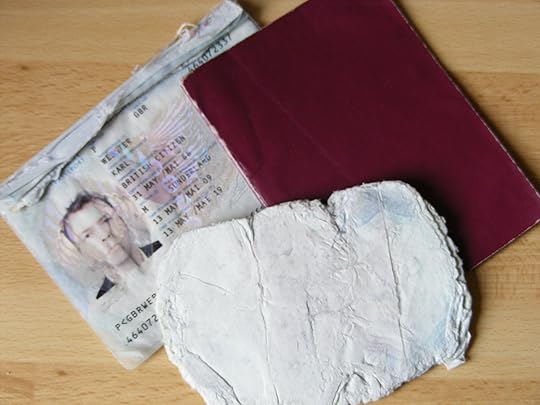 The fused gob of the bulk of the paper being by far the most impressive part…
The fused gob of the bulk of the paper being by far the most impressive part…
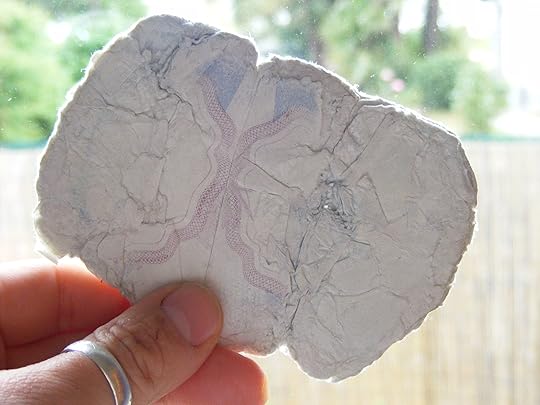 When I did this undeniably stupid thing a few days ago, I posted something about it on Facebook and was told by a friend who used to work in immigration that travelling from France to Italy without a passport would not be a problem because of something called the Schengen Agreement. Another person confirmed this. I then did a quick search online and other conversations on TripAdvisor or some such instilled in me enough confidence to think that I wouldn’t have a problem. So I did nothing about it, figuring I’d have three months in Italy – a country with a language I speak – to arrange a new passport.
When I did this undeniably stupid thing a few days ago, I posted something about it on Facebook and was told by a friend who used to work in immigration that travelling from France to Italy without a passport would not be a problem because of something called the Schengen Agreement. Another person confirmed this. I then did a quick search online and other conversations on TripAdvisor or some such instilled in me enough confidence to think that I wouldn’t have a problem. So I did nothing about it, figuring I’d have three months in Italy – a country with a language I speak – to arrange a new passport.
14:55
There are three French border police at the end of the carriage. They are working their way towards me, asking to see people’s passports, glaring at the documents through what look like hi-tech magnifying glasses. A tiny cuss-word falls from my mouth but my heart does nothing, which is interesting.
Finally they reach me and I hand my novelty passport, fused gob and all, to a shaven-headed policeman. As I do so, I say, in a combination of French and Italian, ‘I may have a small problem.’
When the policeman opens up the document, he makes a shocked noise and, as if at a disrespectful remark in church, chortles sharply. I wonder which excuse to attempt to translate into French. Either ‘I had a bit of an accident with a washing machine’ or ‘A friend on the internet told me everything would be alright’. They both sound pretty flimsy if I’m honest, and my French would mangle them even further, so as I’m handing over my expired Italian ID card, I say, in Italian, ‘May I speak in Italian?’
The French policeman takes my Italian ID card and tells me in English that it’s OK. ‘You ‘ave zis,’ he says.
‘Yes,’ I say, ‘but….’ And I am about to say, ‘But it expired in 2006, and I was never actually allowed to leave the country with it’, but something, thankfully, stops me.
Without checking the expiry date, the policeman hands both invalid documents back to me and, with his shaven-headed colleagues, he moves on.
I glance at the Spanish woman opposite me – the one who has made me think impure thoughts all the way from Paris – and I flash her a relieved smile. Then I stare out the window at the pine-covered, snow-capped Alps and for the next ten minutes or so, I imagine the policeman and his colleagues returning through the same door and asking me to follow them to the torture room.
15:17
I am in Bardonecchia. Despite the fact that the driver announced ‘Bardonique’, the signs are in Italian and I’m beginning to feel confident that I’ve made it. I feel like Mr Nice. I thank good fortune, or incompetence, or Schengen. I find myself smiling. Italy is beautiful.
Now all I have to do figure out where I’m going to stay tonight. No one I know in Bologna knows I’m on my way, as I didn’t tell them, and I have no telephone, or rather SIM card, and no way of getting one without a valid passport.
Ha!
Being wildly disorganised is fun.
Sometimes.
Anon!
May 22, 2013
Modern Art is Rubbish (and Vice Versa)
The locals call them ‘spaces for art’. They are massive, interactive, community-based art exhibitions, out in the open air of rural France. There are many thousands of these giant installations dotted around the country, most of them – like the one I visited yesterday in a village I could not now with any conviction pick from a line-up of two – are comprised of various, separate themed shows, or ‘rooms’. Each room represents – if I might offer my thoughts – a reflection of us, we, the viewer(s), a cross-section of who we are – right now at this exact moment in history – as individuals. Warts and all. Viewed en masse, however, the work becomes a canvas on which the entire human condition is stripped bare and dissected like a vole full of tumours. All of human life is there: the glory, the community spirit, the degradation.
Cyrus has a season ticket, available free to residents, and can visit his local space whenever he likes, interacting with the artworks, adding to and taking away from as he sees fit. All visitors are actively encouraged to contribute in this way. This is what makes this movement of living art – where everyone with an imagination and a love of artistic experimentation can leave their mark – such a bold and unique innovation. With the success of these ‘places of art’, it’s only a matter of time before the rest of Europe catches on.
I took a few photos.
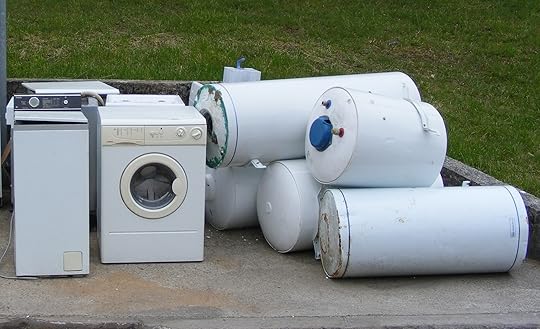
The Unavoidable Impermanence of Consumer Durables
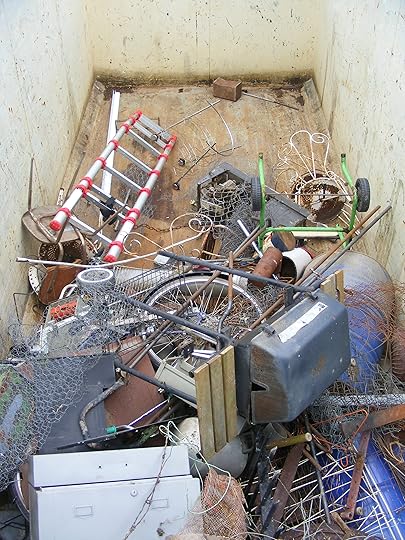
A Smaller Splash
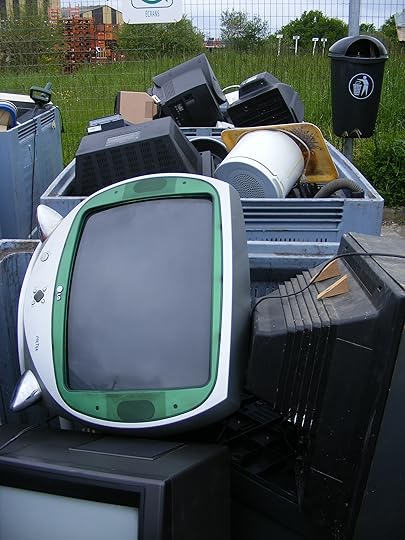
These Televisions Will Not Be Revolutionised
Some challenging stuff there, I’m sure you’ll agree.
So we hung around for a while, soaking up the culture, making a few amendments here and there, then we were about to get going when Cyrus spotted a beautiful thing that he imagined he needed. The space-curate told him that if he could fish it out with the plastic hook on the end of a stretch of strengthened canvas, then he could have it. Cyrus had a go…
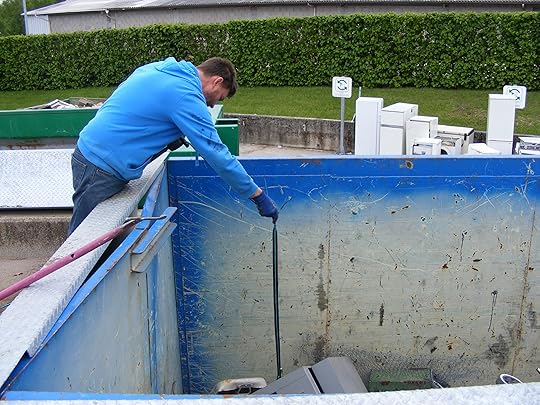
He put in his thumb, kind of…

…and pulled out a plum, kind of.
Unfortunately there were a couple of pieces missing.
Fortunately the space-curate spotted them and fished them out of the heart of the installation…
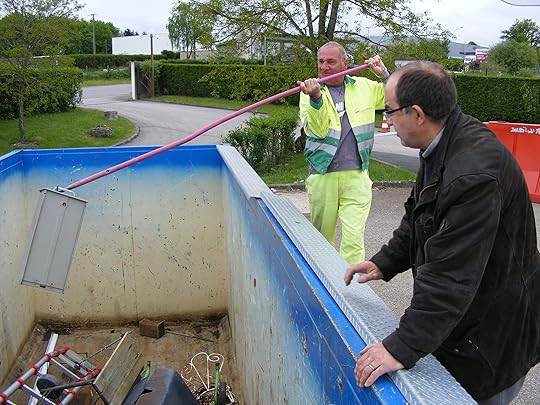
Space-curate and passing art lover
And then the beautiful thing was complete and we transported it carefully back to Cyrus’s house where it took pride of place in the garage-barn, and where it will remain for anything up to nine months, when it will be taken back to the gallery and given another chance…

A beautiful thing
Or will it?
None of us know for sure.
Anything could happen.

